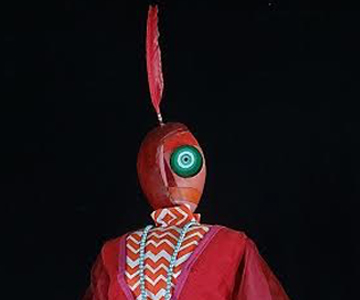

Demolishing Everything with Amazing Speed
Opening Night: July 7, 2016
Closing: July 17, 2016
Theater: Fisher Center for the Performing Arts
A wondrous elevator racing up to the heavens, a rich red woman with a single green eye, a baby smoking a giant cigar. . . . Award-winning puppet artist Dan Hurlin creates a surreal “puppet noir,” based on four beautiful but disquieting plays written at the height of World War I by the Italian futurist artist Fortunato Depero. Hallucinogenic, fast-paced, and shot through with dark humor, these astonishing plays celebrate the energy and possibility of technology, while revealing the chilling parallels between their time and ours. Hurlin, who lives and works in the Hudson Valley, discovered Depero’s scenarios during his Rome Prize Fellowship in Italy. They have never before been translated into English, published, or performed. Hurlin’s unique fusion of puppetry, music, and technology brings Depero’s images and visions—sometimes whimsical, sometimes disturbing and violent—to life on stage for the first time. With a live score by Dan Moses Schreier and combining the latest technology, from 3D printing to sound sampling, with centuries-old bunraku style puppetry, Demolishing Everything with Amazing Speed is a rapturous and wholly original wild ride.
BUY TICKETSREAD THE REVIEWS:
July 10, 2016
The timing could not have been worse — or more perfect. A series of short plays written nearly a century ago acquired an icy and unexpected urgency when they received their belated world premiere last week. And an audience was frozen into the kind of stillness that no one dares interrupt, not even with a startled gasp. The cause of such extreme discomfort was a scene in, of all things, a puppet show, which runs through Sunday at the Richard B. Fisher Center for the Performing Arts at Bard College here as part of its SummerScape festival. True, this work of cryptically stylized vignettes, written in 1917 by the Italian Futurist artist Fortunato Depero and midwifed into stage life by the American designer and director Dan Hurlin, bears the title of “Demolishing Everything With Amazing Speed.” But that name could describe a comedy of anarchy starring the Marx Brothers or the Three Stooges. Certainly, the first half of this 75-minute production — enacted by toddler-size Bunraku puppets manipulated by a visible team of performers — would seem to suggest a rarefied variation on such rowdy fare. A chicly dressed drunken lady in red (albeit one with a single peacock-feather-like eye and a turnip-shaped head) struggles to find her footing on a shifting red staircase and falls; a husband and wife (green-skinned and bespectacled) progress from what looks like an everyday domestic argument into increasingly agitated warfare that peaks with their removing each other’s arms. The gray-haired woman seated near me watched these activities with the audible delight of a chuckling child at a Punch and Judy show. But like everyone else, she fell silent when a dapper, portly puppet suddenly loomed over an upstage wall of screens. He was holding a red rifle, which he trained on an animated corps of hand puppets gathered below. One by one, they fell over, as a projected image tallied the body count. In prefatory remarks to the audience on Friday night, the festival’s director of theater programs, Gideon Lester, warned that the fragmented stories of “Demolishing” would bring to mind the “terrible events of the last few days and weeks.” (The fatal shootings in Minnesota, Baton Rouge and, the night before, Dallas were still fresh to the point of rawness.) But because this was taking place on the sort of college campus where syllabuses could be tagged with “trigger warnings,” I was skeptical. How upsetting could an esoteric puppet show be, even one from an Obie-winning artist like Mr. Hurlin, whose previous subjects have included the bombing of Hiroshima? But “Demolishing” — the text of which was discovered by Mr. Hurlin during a fellowship at the American Academy in Rome — would be harrowing at any point during the past century. It was written during World War I, and that epochal conflict no doubt informed these plays’ vision of a world of mechanized death-dealing, a point that Mr. Hurlin underscores with video footage toward the production’s end. For the Futurists, who glorified technological speed and force over all humanist virtues, war was good, notoriously described by one of the movement’s proponents as the “world’s only hygiene.” The tone of “Demolishing” is triumphantly macabre, unfolding as a bright catalog of carnage and vivisection, in which classic love and crime stories become automated Armageddons. The destruction is realized with remarkable tidiness, even as bodies and landscapes come apart. A bowler-hatted narrator (a real person, Jennifer Kidwell) recites Depero’s stage directions (the plays were meant to be performed without words) with a resonant voice and unsmiling mien. But the show’s strangely complacent detachment comes across most powerfully as you watch the puppeteers, who wear identical white boiler suits, guide effigies into action. None of the puppets are close to life-size (they are often captured in simulcast video, designed by Tom Lee), and they are visually dwarfed by the human bodies that make them move. Yet as the show continues, the production’s elements (including expert lighting by Tyler Micoleau and music by Dan Moses Schreier) meld into an eerie unity. The expressionless puppeteers become one with their puppets, moving as if by mechanical reflex in what feels like a ghastly and inevitable historical march toward annihilation.
READ THE REVIEW


















